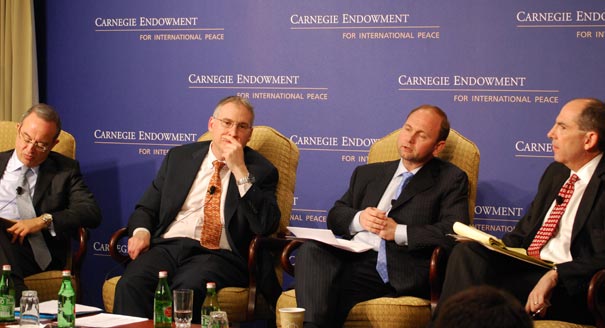Registration
You will receive an email confirming your registration.
IMGXYZ3645IMGZYXThe Palestinian economy made significant advances in recent years under Prime Minister Salam Fayyad’s institution building program, yet questions remain regarding the sustainability of such progress in light of the ongoing, and seemingly long-lasting, diplomatic stalemate with Israel.
Council on Foreign Relations' Robert Danin, the International Monetary Fund's Oussama Kanaan, and Firas Raad, acting head of mission of the Office of the Quartet Representative Tony Blair, examined the current status of the Palestinian economy and its future prospects, the political impact of the Palestinian Authority’s financial situation, and the peace process. Carnegie's Marwan Muasher moderated.
Current Status of the Palestinian Economy
- 2007 Economic Strategy: Kanaan emphasized that any analysis of Palestine’s current economic situation should look back at the economic plan developed by Prime Minister of the Palestinian Authority (PA) Salem Fayyad in 2007. Fayyad’s economic strategy in 2007 focused on economic growth, reducing unemployment, and improving fiscal policy and had the support of the international community. While the strategy did produce greater economic growth and more efficient state institutions, Kanaan added that a number of major issues persist:
- Political Obstacles: Despite increased economic growth between 2007 and 2010, progress stalled after Fayyad’s economic strategy failed to overcome the political obstacles to sustained growth, such as increased restrictions on the movement of people and goods.
- High Unemployment: Unemployment remains high—approximately 22 percent overall in Gaza and the West Bank, 17 percent in the West Bank alone, and 33 percent in Gaza.
- Unfulfilled Promises: Donors have not fulfilled their promises, creating a revenue/aid constraint on growth.
- Regional and Sector Disparities: Regional and sector inequalities continue to be a challenge and make growth unsustainable.
- Key Challenges: Raad identified several key challenges facing the Palestinian economy today:
- Unemployment: Joblessness is very high, particularly among the youth (there is 25 percent youth unemployment in the West Bank and 46 percent in Gaza). The Quartet is trying to address this issue by encouraging Israel to issue more work permits to unskilled Palestinian workers, but this is only a short-term solution. In the long-term, Raad explained that it is important to promote investment.
- Investment Climate: There is a need to improve the investment environment, which requires greater freedom of movement in the PA and increased access to finance.
- Restrictions to Growth: There are a number of serious obstacles to growth, including a need for greater access to land, restrictions on movement, lack of domestic production within the PA, and import bans. Raad pointed out that the gas reserve in the Mediterranean could be a boom to the Palestinian economy.
- Need for an Export-driven Economy: Although the Quartet convinced Israel to permit exports from Gaza to reach outside markets, there is a need to establish greater trade and take advantage of Free Trade Agreements with Arab countries. One step in this process is to containerize the Allenby Bridge in order to improve shipping capability.
- Growth in Strategic Sectors: The PA needs to unleash growth in strategic sectors like tourism, agriculture, and pharmaceuticals, Raad concluded.
- Three Parts of an Integrated Whole: In 2007, the Fayyad government focused its strategy on three main issues as parts of an integrated whole: good governance, economic growth, and enforcing security, Danin explained. Now, he noted, two of these three parts have receded because of political stagnation and economic downturn, which, in turn, is placing more pressure on the security sector.
Future Prospects
- Need for Greater Cooperation: There is a need for greater cooperation between the PA and Israel in order to resolve many of the constraints on growth, such as the restrictions on the movement of people and goods, Kanaan stressed.
- Israel’s Role: Israel should take a number of steps to facilitate economic growth in Palestine, including relaxing restriction on movement and foreign investment, granting more work permits, reviewing the dual use regime, and facilitating exports from Gaza and the West Bank overseas, Raad said.
- Palestinian Economic Strategy: Raad added that Palestinian economy strategy should focus on encouraging domestic production, increasing exports, and improving trade.
- Need for an Integrated Strategy: Danin called for a return to the idea of good governance, economic growth, and security as an integrated strategy for addressing the Arab-Israeli conflict, as well as improving the prospects for the Palestinian economy. In order to move forward, Danin argued that there needs to be momentum toward an end to the occupation and each party has a role to play:
- United States and the International Community: Although U.S. President Obama’s May 2011 speech outlined a vision for the region, there has been little diplomacy to back it up. The international community, including the United States, need to play a more proactive role.
- Arab Country Donors: Arab country donors need to fulfill their financial commitments.
- Palestinian Role: Palestinians need to develop a coherent strategy and strengthen their existing institutions.
- Israeli Role: Israel needs to ease restrictions relating to revenues, movement, investment, and exports.
